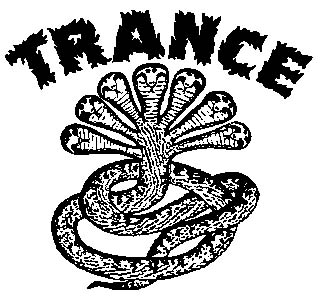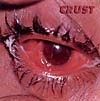Weird Bands From Texas
By Greg Beets, Fri., Nov. 20, 1998

When Butthole Surfers drummer King Coffey made his New Year's resolution to start a record label at the cusp of this decade, years of recession and regurgitation had stagnated to a nadir from which something different, if not better, had to emerge. Jobs were scarce, money was tight, and the sterile affirmations of Jesus Jones summoned forth a happy future with all the enthusiasm of a popcorn fart. Pastel-coated power ballads and sexed-up retreads of Seventies arena rock bacchanalia only added wind to the bag. Continuous exposure to this "Don't-Worry-Be-Happy" pop placebo clearly demanded an overdose of mondo screeching cynicism to restore some semblance of psychic balance. As Ed Hall's drummer Lyman Hardy so eloquently stated, "When everything sounds like Wham!, there's going to be an equal and opposite reaction."
This opposite if-not-entirely equal reaction slowly gained ground throughout the Eighties and early Nineties at a forever tenuous network of mostly dingy, fly-by-night clubs that would eventually coalesce under the unfortunate banner of "alternative music." Austin was no different. In 1990, the Cannibal Club was the local mecca of all rock to the left of Bang Tango. It sat like a missionary outpost in the otherwise hostile territory of Sixth Street right next to a dollar-kazi meat-market called Hugo Boner's (I'm not making this up).
Amid the mosh-pit funk and collegiate pop, another more derisive style of music began taking hold. Texas bands like Ed Hall, the Pain Teens, Lithium X-Mas, and Crust were taking punk rock's freedom and fury to new places. Incorporating elements of psychedelic, industrial, and maybe a dash of Seventies shock rock, these bands confronted audiences with the difficult art of breaking down what rock had become. The music was unforgivingly loud and the subject matter lurid, but that only made it clearer which side you were on.
Despite their growing club draws, record label options for weird bands from Texas were bone slim in 1990. Rabid Cat Records, the Austin label that released seminal works from Scratch Acid, the Texas Instruments, and the Offenders during the Eighties, was no more, and the only existing labels that would possibly commit themselves to local bands like Ed Hall or Crust were thousands of miles away on either coast. Instead, most bands just self-released tapes and maybe a stray piece of vinyl through a distribution network that usually ended somewhere near 51st Street.
By now, it was obvious that having a nationally distributed label in your backyard tended to improve the viability of local music beyond provincial boundaries. The symbiotic relationships between Seattle and Sub Pop, Minneapolis and Twin/Tone, and Chicago and Touch & Go were not lost on Austin. Even if these local labels didn't focus solely on local artists, they still managed to convey a sort of mythic vision of the rock music scenes in their respective cities. In time, King Coffey's Trance Syndicate label would do something similar for Austin.
The prolific, nine-year lifespan of Trance
Syndicate Records is ultimately a much more salient exclamation point in local music lore than news of the label's demise. After all, any label can go out of business. And while the body's still too warm to gauge whether "The Trance Years" will wind up being slowly forgotten or waxed into the ground by sentimental contemporaries, given Texas' longstanding tendency toward knee-jerk veneration, the latter would hardly be a stunner. Either way, Trance's good, long run and its nothing-if-not-adventurous catalog both serve as irrefutable evidence of the label's unique tenacity and vision.
|
|
Coffey's 1990 resolution did indeed come to fruition that year, with the release of Crust's The Sacred Heart of Crust EP. However, the label's genesis can be traced back to Coffey's involvement in the Dallas/Fort Worth punk rock scene as a youth.
"The whole do-it-yourself ethic was a very profound thing," he says. "Even though I didn't know how to play an instrument, it didn't stop me from forcing myself into a band and becoming a drummer. I wanted to have a fanzine, and I did that in high school. Then I wanted to have a punk rock club. In fact, I moved to Austin in 1983 with dreams of opening up a warehouse and having bands play there."
Although Coffey did manage to line up a warehouse in far North Austin for his dream venue, the owner kindly asked him to "move far away" upon discovering his intentions. Coffey took the warehouse owner's advice, in a manner of speaking, when he started drumming for the Butthole Surfers. The band's exhaustive tour schedule during the Eighties necessitated a nomadic lifestyle that precluded the idea of starting a business.
In 1989, when the Buttholes were home long enough for Coffey to get situated, he began seriously contemplating yet another youthful DIY dream: starting his own record label. He'd managed to save a few thousand dollars and was keenly aware of the abundance of unheard music in Texas. The time was right for another label to document the sun-seared excesses of the Texas fringe. Houston's International Artists label did this in the Sixties when bands like Roky Erickson's 13th Floor Elevators, the Red Krayola, and Bubble Puppy ruled the freak roost, but IA also had a reputation for screwing artists out of money. Coffey set out to do things differently.
"I was hoping that Trance would be a lot more artist-driven," he says, "that it would be run from a band perspective instead of a label perspective."
Coffey credits Austin's Crust as his musical impetus for starting Trance. The experimental shock-punk trio mixed found instruments, loops and samples, religious satire, and scatology in a manner that was both entertaining and inspiring. Seeing the Rev. Art Bank Lobby pull worms from his diaper or trying to light his pubic hair on fire while singing songs like "Hard Stool" and "Chlamydia Is Not a Flower" were not sights you'd soon forget even if you really wanted to.
Meanwhile, another local band, Ed Hall, foraged for a hypnotic groove underneath a shit-rain of freestyle guitar insanity. It was joyous noise, made all the more exciting by the band's stage theatrics. The trio covered themselves in flour for a while, until they realized the flour dust could ignite and go up like a mini grain elevator. Eventually, they switched to fluorescent body paint, bathed the stage in black light, and played against a backdrop of bizarro film loops by Luke Savisky or movable, larger-than-life marionettes of the band. Houston's Pain Teens steered the punk aesthetic in a more industrial direc-tion, utilizing a Pandora's box of S&M imagery to drive their point home.
Before Trance came along, Ed Hall had recorded two albums for Berkeley-based Boner Records, the Pain Teens had released a wealth of material on their own Anomie label, and Crust had self-released cassettes. If you were in a band and wanted to put out an album nationally, you had to get the attention of an out-of-town label and take care of business over the phone.
"I was talking to Crust and they were trying to get people in California like Alternative Tentacles interested in putting out their record," recalls Coffey. "I could really relate to that because it kind of parallels the story of the Buttholes. The band had to go out to California and play live to get Jello [Biafra]'s attention. By the same token, I was really kind of disappointed. At that particular place and time, there wasn't a label here in Austin that was putting out records by bands like Crust."
Coffey found inspiration from the label perspective at Touch & Go, the Butthole Surfers' label for much of the Eighties. Touch & Go had cultivated a solid reputation as a label that worked hard for its bands and dealt with them fairly. Coffey envisioned a sort of Lone Star version of Touch & Go that would promote Texas bands on a national level. This connection would provide Trance with a serious boost, especially in the label's fledgling first year.
"Very early on, I realized perhaps I was getting in over my head, so I asked Touch & Go if they'd want to manufacture and distribute Trance," recalls Coffey. "This wasn't in place when Trance started. Halfway through production of the Crust record, I realized I was just about to run out of money and I still hadn't gotten the covers made. I was panicking, and I called up Touch & Go and they came to my rescue."
A big point of coalescence was Trance's first South by Southwest label showcase in 1991. The show took place at the Ritz, which at the time was a dilapidated husk of muck and noise more famous for earsplitting feedback than lounge music and pool tables. Bands like Crust and Lithium X-Mas shook the rafters loose, and from then on, you knew the Trance showcase at SXSW would be a permanent odds-on favorite for high musical weirdness.
"That seems like one of the happiest moments of my life in a way, and it was one of the more fonder moments of Trance," says Coffey. "Just seeing all these really great Texas bands playing one by one at the Ritz had a sentimental value. We saw so many great bands play there in the Eighties, from Minor Threat to the Big Boys to Big Black. It was really fun to see punk rock at the Ritz."
Although Trance was a small operation run entirely by Coffey and his partner Craig Stewart, connections to Touch & Go and the Butthole Surfers made the label an attractive option for a band like Ed Hall. After recording two albums for Boner, Ed Hall came home to Trance for 1992's Gloryhole.
"King gave us more money than Boner did to make a record," recalls guitarist Gary Chester. "He wanted to hook us up with Butch Vig, this big-time producer, but he was already doing Nirvana's record. He was really enthusiastic when he first signed us up to get us a good producer, get us on a good tour with the Buttholes, and really help us out a lot. Plus, he'd watch our dog."
 |
 |
 |
 |
 |
 |
 |
 |
 |
 |
 |
 |
 |
 |
"People seemed to hear about Trance a lot, but when we'd go look for our albums, it would still be hard to find them," says Chester. "It was good, but it was still a real small business."
Unlike most small, independent labels, Trance managed to establish a small-but-loyal European beachhead. Ed Hall saw this firsthand during their 1994 European tour in support of Motherscratcher.
"The first time we went over, there would be someone in every crowd who came up and said, 'Hello, I have everything on Trance,'" says Hardy. "Anything Trance put out, there was a certain demographic that would follow it ravenously, even more so than in the U.S. Most of their punk rock leans more toward the garage thing and then they have the big dance culture, but they don't have the same sort of psychedelic punk rock thing that Trance seemed to have."
Back home, Trance released the Cherubs' Heroin Man, one of the best local releases of 1994. The trio of former Ed Hall drummer-turned-guitarist Kevin Whitley, Coffey's Drain collaborator Owen McMahon, and drummer Brent Prager had an ugly swagger that curdled your brain with nightmarish, fuzzed-up guitars and an undulating beat. Unfortunately, the band was DOA by the time Heroin Man came out. The breakup routine also happened with johnboy right before the 1994 release of Claim Dedications, their second album of well-structured, harmonic punk.
In spite of Trance's grow ing reputation, Coffey was always wary of the label being pigeonholed into a certain sound. When the Love and Napalm compilation album came out in 1993, he was distressed to see reviewers holding it up as a comprehensive document of the Austin music scene.
"It seemed to imply that this was the way Texas bands sound, which was a mistake," he says. "We all know that Austin and Texas have a lot of different sounds. I guess maybe I made the mistake of finding six sympathetic bands within the same geographic area to all appear on the same record."
Musically speaking, any lingering notions of a singular "Trance sound" were snuffed out once and for all when the label released Bedhead's WhatFunLifeWas in 1994. The Dallas-based quintet played essential and elegant pop music that called for a quieter, more cerebral mode of listener interaction. Bedhead had a keen ability to create warmth and intimacy in the studio at a time when loudness and extreme distortion made up the dominant paradigm. You couldn't get much further from what Trance had been without abandoning rock music altogether.
"I liked the idea that it was very atypical from what a standard Trance release would sound like or even look like," says Coffey of WhatFunLifeWas. "Bedhead themselves made a really bold statement, not only musically, but in how they packaged the record in this really simple, beige packaging. Most Trance releases were very garish, in-your-face kind of stuff. Bedhead also asked if they could redesign the Trance seven-headed cobra logo because it really didn't seem to fit in with their packaging idea."
Mixing it up was always on Coffey's agenda for Trance. In fact, he chose the name Trance Syndicate instead of something like "Freak Syndicate" precisely because it could work with all different types of music. The label's output is testament to the fact that adherence to a sound or standard did not play a role in choosing artists. Similarly, commercial potential and willingness to tour were also non-issues for Trance; Coffey committed himself to Furry Things on the basis of a demo before the band even played its first show.
"It's the difference between, 'Yeah, this is pretty cool. I like it,' and 'Yeah, I want to invest my time and energy and money into putting out this record, perhaps at the expense of others,'" explains Coffey. "There's a lot of intangibles that go into that."
One of Trance's biggest and most heartfelt investments was working with Roky Erickson on 1995's All That May Do My Rhyme. Erickson's status as a monumental figure in Texas music was further cemented by the fact that everyone from Paul Leary to Charlie Sexton to Lou Ann Barton participated in the recording. Coffey was honored to work with Erickson, but it was also an awesome responsibility.
"Here was a guy who is one of Texas' most well-known songwriters and artists, but he's living off of welfare and has barely seen any money at all from his incredible wealth of music," says Coffey. "I was feeling all this pressure that it was up to me to make everything right and seek justice, so I was kind of freaking out.
"And it wasn't a cheap record, either. I literally had to cash out my life savings to pay off the studio bills and the licensing fees. But it was something that I really, really wanted to do and I thought that I would do a good job at it in contrast to a major [label]. A major might sell more records than Trance, but they certainly wouldn't give Roky as much money. Plus, I was in town and I cared.
"For about a year there, me and some other friends of mine were kind of helping as caretakers along with Evelyn [Erickson, Roky's mother]. It really brought interaction with an artist to a whole new level. It's one thing to be supportive of a punk rock band on your label, but to begin bringing groceries or trying to get an artist medication because he really needs it and talking to his mother and talking to lawyers ... boy, there's just a whole lot of dynamics there at play."
In addition to the Erickson album, 1995 saw Trance hosting a hot-ticket SXSW showcase at the Terrace featuring Bedhead, Ed Hall, Furry Things, Sixteen Deluxe, and a special guest appearance by Bob Mould. In fact, the biggest Trance-related story that year was the unexpected swarm of attention that surrounded Sixteen Deluxe after the release of their single, "Idea." A perfectly executed piece of pop songcraft with just enough feedback to make it interesting, "Idea" also sounded great on the car radio. Suddenly, one of the nation's most iconoclastic indie labels had a bona fide buzz band on their hands.
"In retrospect, it's just amazing that we didn't implode," says vocalist/guitarist Carrie Clark. "It wasn't that we were trying to rush forward so much as there was all this attention descending on us and the band wasn't even a year old."
Suddenly, Coffey and Sixteen Deluxe were getting phone calls from all the major labels. After releasing Backfeed Magnetbabe on Trance, the local quartet signed with Warner Bros. and released one album, Emits Showers of Sparks, before being dropped by the label this fall.
"In a way, I kind of feel sorry for them, because most bands get to be a band before getting hit over the head with major label deals and A&R people promising slots on Lollapalooza," says Coffey. "It was really hard. It put a lot of pressure on them."
For her part, Clark thinks Coffey did his best to play the role of "cool uncle" in giving Sixteen Deluxe advice on how to deal with all the attention. "King tried really hard," she says. "He tried to give us his best insight as a friend. In retrospect, he said a lot of shit I probably could've listened to a little bit better, but things were just moving so fast."
At the height of the major labels' "Who's-the-Next-Nirvana?" feeding frenzy, Coffey considered asking bands to sign three-album contracts to avoid the possibility of losing a hot band to a major label before having a chance to recoup his investment. However, the only band that signed a multi-album contract with Trance was Bedhead.
"Truth be told, I didn't trust them at first," admits Coffey. "I thought, 'Man, they're going to record one album for us and go off to a major,' so I did ask them to do three albums with us. As it turned out, they did. They did indeed get offers from elsewhere, but Trance is where they wanted to be."
One of the reasons Coffey didn't make multi-album contracts into standard Trance policy was his disdain for indie labels that seem to be more interested in selling a band's contract to a major label than selling the band itself.
"When you're trying to make money off an indie record label, I think you're incredibly suspect," he asserts. "And when you're really doing it to aggressively try to find major label deals for bands already on your label, I think it's a form of pimping. It's really gross. Now I have to admit that during the Sixteen Deluxe thing, there's a possibility that had I signed Sixteen Deluxe to commit to more than one album, maybe I could've made some money. But I think it would've been very ugly money for me and I would've had a hard time dealing with it."
Clark says Sixteen Deluxe's experience with Trance ultimately helped show the band what to look for in a major label, perhaps making their experience with Warner Bros. more humane than it could have been.
"King really instilled in us the idea that you hang out with people that dig you, not people who want to market you," she says. "He just planted a lot of good seeds early on. It's not so much about punk rock or indie ideals, but just a lot about love. It all comes down to the fact that he was doing Trance because he loved it."
By 1996, Trance was branching out in a number of ways. Craig Stewart took the helm of the label's new Emperor Jones imprint, ostensibly the arm of Trance with a non-Texas emphasis. Emperor Jones came out of the gate with an eclectic line-up that included offerings from My Dad Is Dead, the Mountain Goats, and Home. Meanwhile, newer Trance bands like Furry Things and Windsor for the Derby were heading off in a more electronic, beat-driven direction. The wide-open ambient soundscapes of Furry Things' hedfones EP held hypnotic sway with the band's sharp focus on groove and texture, while the sparse electronic songs on Windsor's Metropolitan Then Poland EP hinted at a post-apocalyptic version of Kraftwerk.
Which isn't to say Trance has abandoned guitar-based music in recent years. Until their recent breakup, Starfish purveyed power-trio hard rock with an evil bottom end, and both The American Analog Set and Monroe Mustang use plenty of guitars in their respective quests for living-room transcendence. However, the two newer bands that have the clearest lineage back to Trance's earsplitting past are Paul Newman and ... And You Will Know Us by the Trail of Dead. For Trail of Dead's Neil Busch, a "next generation" moniker might even be appropriate.
"Trance is something I grew up with," he says. "I was living in Houston when they were still putting out the Pain Teens, Crust, and Ed Hall. All of us who were wee teens at that point looked up to Trance as something that was well within the realm of possibility for one of our bands. What everyone wanted to do was to put out a record on Trance because it had a lineage that was kind of like a family."
As a Trance artist, Busch found that the family concept went beyond mere lineage. "Every tour, we haven't had enough money to buy [our] records [to sell at shows] and they've gone ahead and bought them for us," he says. "We've had disasters on tour and have had to borrow money from them. They're emotionally supporting as well."
Trail of Dead's biggest tour disaster occurred recently in New Orleans when their van was stolen with all their equipment inside, bringing the tour to an end just a few days into it. "That's just devastating, you know?" says Coffey. "I'm not saying that any other indie label would take that lightly, but for me, I can put myself in their shoes. I know how horrible and sickening this makes you feel."
Unfortunately, all good things must come to an end, and Trance is no exception. After nine years, Coffey recently decided to shut down Trance. The label's final release -- Starfish's The Instrumental EP -- came out earlier this month. The reasons for Trance's demise are myriad, but it essentially boils down to burnout.
"I feel a lot of responsibility to the bands I work with," relates Coffey. "It's almost like a parental responsibility. I don't think I've been doing as good a job in the past few years as I was back in the early or mid-Nineties. I'm kind of working on autopilot. While I still like the music I'm putting out, I'm just not having fun with it.
"It dawned on me earlier this year that I didn't have to do this. While what I'm doing is worthwhile and it contributes to the music scene, we're not feeding hungry children here. These are just fucking compact discs that will get thrown in with tons of other compact discs. It's not up to me to put out music that I like. Hopefully other people can do this. It's time for me to give myself a break."
Contributing to Coffey's burnout was the Butthole Surfers' lawsuit against Touch & Go to obtain their back catalog. The fracas placed Coffey in the awkward position of being a litigant against the company distributing his label's product.
"I personally thought the lawsuit was a really bad idea," he says. "I was against it, but it seemed to me that my bandmates and Corey [Rusk], who runs Touch & Go, could not reach an agreement. They were being really stubborn and no amount of mediation on my part was going to resolve anything. Both parties were sticking to their guns. I realized all I could really do is just sit back and let those guys have their lawsuit, which for me was really depressing. It's really a drag to watch friends argue and take it to the courts. It really brought me down.
"While it was well-known within Touch & Go that I had nothing to do with this, there was still a fair amount of subtle pressure: 'Here's King, whose band is sueing Touch & Go, and here's King, whose label we're manufacturing and distributing.' Between myself and Touch & Go, we all had to be very mature. But it gets tiring being mature."
Earlier this year, before the court case was decided (the Buttholes retained rights to their catalog) Coffey considered just putting Trance on hiatus in order to leave open the possibility of doing some low-key releases in the future. He e-mailed this plan to Touch & Go and didn't hear anything for about a month.
"Finally, Corey said, 'No,'" relates Coffey. "He said it's our decision if we keep putting out records, and certainly all the records will be kept in print. But he said as much as he liked me as a person and knew I wasn't the instigator behind this lawsuit, he still knows that I was one of the band members named in the lawsuit and I need to take some accountability for this. Therefore, he didn't want to be releasing any new Trance records. I understand that. I guess the cards that played out were that I quit and later on the boss said, 'Well, you're fired.'"
While Trance is shutting down, Stewart will continue to operate Emperor Jones on a scaled-back level. One upcoming project, due in February, is a Roky Erickson album with 14 never-before-heard songs from homemade recordings unearthed by Texas Music Office Director Casey Monahan. Some of the songs were recorded while Erickson was incarcerated in the state mental hospital at Rusk in 1971. All net profits from the disc will go to Erickson's trust fund.
"It's not any way to start off a fledgling label, because Emperor Jones is pretty bankrupt right now," says Stewart, "but I think it's pretty important for Roky."
|
|
Ironically, the DIY vibe upon which Trance was predicated has helped create a glut of product on the market which slowed sales for the label in recent years. However, Stewart views this trend with his eyes on music instead of the bottom line.
"There's this amazing abundance of good music," he says. "It wasn't like this at all 10 years ago. It used to be I was waiting for good records to come out. Now, I've gotta save up because there's so many I want."
Trance had a mix of black years and red years throughout its run, but Coffey says the difference was always pretty slight in either direction. He didn't start Trance to make money, but it's heartening to hear the label is finishing a bit ahead after all the time and energy Coffey and Stewart invested.
"I think when it's all said and done at the end of this year, the label sees some money," says Coffey. "Not a whole lot, maybe a couple of thousand."
The void left by Trance's departure will definitely have an impact on the visibility of Austin's underground music scene beyond the city limits.
"It really did Austin well as far as promoting a scene down here that most people didn't think was alive," says SXSW Showcase Manager Dave Thomson. "I think they should be commended for that. Everytime SXSW did a showcase for Trance, there were lines down the street of people wanting to get in. It's something that people wanted to see. Trance is going to be sorely missed and I don't know if there's anything in Austin that's remotely close to replacing it yet."
Though Coffey is stepping away from the indie label business with somewhat mixed emotions, he's genuinely proud of Trance's nine-year legacy.
"I think my involvement with Trance has contributed more than my involvement with the Butthole Surfers," he asserts. "I'm not slagging my bandmates, but the Butthole Surfers are just one band. I've had a chance to work with a wide variety of Texas bands and share what I have with other bands. It's really meant a lot to me."








